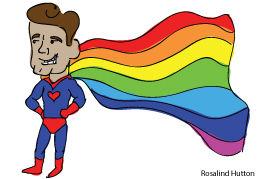Mississippi State University held its annual Safe Zone Ally Training Workshop this year for students, faculty and staff to raise awareness for the LGBTQ community.
This workshop was led in coordination with Pride Week, a week dedicated to promoting LGBTQ equality by hosting events at the MSU campus and in downtown Starkville.
Sponsored by MSU’s Safe Zone Advisory Board and the Holmes Cultural Diversity Center, students, faculty and staff joined the workshop focused on how to be a Safe Zone Ally, and specifically how to promote welcoming environments for the LGBTQ community.
MSU Student Counseling Center psychologist Ty Stafford led the Safe Zone Training Workshop and guided attendees with an overview of it, including explanations of what is and is not an ally, how to build confidence and skill as an ally, as well as open discussion and scenarios of what an ally would do when a member of the LGBTQ community is faced with discrimination.
First, Stafford explained to attendees what exactly an ally is. According to the Human Rights Campaign, a Safe Zone Ally is one who is supportive of LGBT people, and comprises straight allies as well as those in the LGBTQ community.
Allies strive to promote acceptance to those in the LGBTQ community in many ways, such as listening with an open mind, being willing to talk in any situation that arises, and engaging in the work of creating a culture free from prejudice, gender discrimination and transphobia.
However, an ally is not someone who is trained as a crisis counselor or expected to act alone when dealt with difficult issues of prejudice and conflicting issues an ally may be unsure of how to handle.
Secondly, attendees were taught helping skills to support any LGBTQ member who may be faced with a crisis. Attending to the individual and asking open-ended questions showing genuine concern are some examples of showing the individual they are not alone in dealing with an issue.
During this discussion, it is important to give information to the student resources at MSU, which they can refer when educating him or her—such as the financial department, health services or counseling services, depending on the type of problem they may be dealing with. During this time, it is important to help the student identify, evaluate and choose alternative solutions after the student has explored the issue.
Thirdly, attendees were given information on how to speak up in cases of bigotry against members of the LGBTQ community. Stafford cited the Southern Poverty Law Center guidelines in fighting prejudice toward LGBTQ members. Becoming prepared for this behavior, identifying it and calling on the person’s higher principles are proven to be effective types of action in the case of discrimination.
Lastly, Stafford gave general tips on how to create inclusive environments for the LGBTQ community. Avoiding assumptions about sexual orientation and gender identity, and using the individual’s preferred name or pronoun are some supportive actions students, faculty and staff can take in advocating Safe Zones for any LGBTQ member.
The main thing to understand in becoming an ally, however, is knowing one will not always perfectly address situations with an LGBTQ student. When a mistake is made, it was advised to accept feedback when given and apologize.
Kei Mamiya, program coordinator for the Holmes Cultural Diversity Center and member of the Safe Zone Advisory Board, explained how training sessions such as the Safe Zone Workshop helped create more awareness of the LGBTQ community and create a support system at MSU.
“I think people are more interested in those types of programs, and just supporting the community in general,” Mamiya said. “That’s something that I have seen since I started doing this because my intention is really to raise awareness and visibility of the programs and the community itself on campus.”
Audrey Gunn, assistant professor and instruction and distance education librarian, stated the significance of the Safe Zone training on responding to LGBTQ needs on campus.
“I think it’s important to do everything we can to support LGBT people on campus, and I want to be a good ally to them and do anything that I can as a representative of the library to produce an inclusive and welcoming space for our students,” Gunn said.
Safe Zone workshop strives to build allies at MSU

Safe Zone Ally
0
Donate to The Reflector
Your donation will support the student journalists of Mississippi State University. Your contribution will allow us to purchase equipment and cover our annual website hosting costs.
More to Discover












